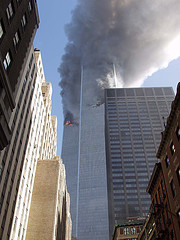This is a rough-and-ready theory, so I’m going to express it as a series of points a-la “axioms X, Y and Z, therefore deduction Q”.
- TV conditions us to expect certain things from the world, even if unconsciously.
- A viable definition of paranoia might be ‘the recurring and unfounded expectation that dramatic things are happening or just about to happen’.
- Another definition might be ‘the mistaken correlation that normal or commonplace causes will reliably lead to dramatic effects’.
- On TV, in order to retain viewer interest, dramatic things happen all the time, even when the portrayed causal events are quite normal or commonplace.
Therefore: prolonged exposure to almost any television content predisposes us to expect dramatic things, or to mistakenly predict dramatic consequences when innocuous things happen. In short, exposure to TV induces paranoia.
A couple of things occur to me that don’t fit so cleanly into the argument, but which support it:
 Even TV news is a concentration of the dramatic. The word ‘newsworthy’ essentially means unusual or dramatic. Inductive reasoning based on the news will lead one to expect warfare, violence, and general mayhem all the time.
Even TV news is a concentration of the dramatic. The word ‘newsworthy’ essentially means unusual or dramatic. Inductive reasoning based on the news will lead one to expect warfare, violence, and general mayhem all the time.- Good dramatic fiction of any kind, inclusive of TV drama, will typically try to obtain suspension of disbelief and try to make the viewer identify with some character or group. Both of these things focus on the intent of reducing the viewer’s ability to discriminate between fiction and reality. The less clearly a viewer distinguishes fiction from reality, the more potential there is for the fiction to influence the viewer’s expectations about reality.
If all this seems obvious to you, I’m sorry for wasting your time. It stuck me as a point that needed making, with serious, subtle, nasty ramifications all over the place.

Hmmm, what would Philip K. Dick say if he watched some contemporary television?